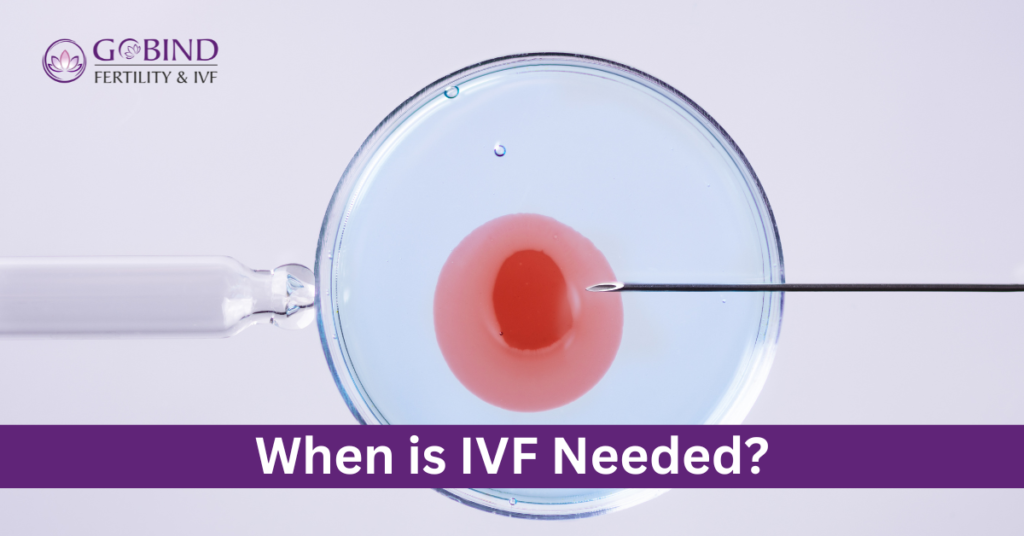When Is IVF Needed? Top Signs to Consider In Vitro Fertilization

In vitro fertilization (IVF) is a reproductive option that can help people become pregnant when other fertility methods have failed or aren’t working. IVF is recommended for couples dealing with infertility due to various factors, such as blocked fallopian tubes, male factor infertility, endometriosis, or unexplained infertility.
In-vitro fertilization (IVF) has emerged as a cornerstone in the domain of assisted reproductive technology, offering hope to many needy couples.
Indicators That IVF Might Be the Right Choice
Repeated Unsuccessful Attempts with other medical methods
IVF becomes a critical consideration after multiple unsuccessful fertility treatments. For instance, a woman experiencing over six failed cycles, where a significant number of oocytes remain immature, may turn to IVF as a viable option.
Advancing Age and Fertility Decline
The decline in fertility with age, particularly after 35, significantly impacts the chances of natural conception. IVF offers a solution, especially as the quality and quantity of oocytes decrease, making natural conception more challenging.
Medical disorders
Certain medical conditions necessitate IVF, including blocked fallopian tubes, endometriosis, and PCOS, which directly interfere with the natural ability to conceive. IVF bypasses these complications by facilitating fertilization outside the body.
Male Infertility Issues
IVF is often the treatment of choice for severe male infertility issues such as low sperm count or poor sperm motility. Techniques like ICSI, where sperm is directly injected into the egg, are used to enhance success rates in such cases.
When Less Invasive Treatments Are Not Effective
When less invasive fertility treatments fail to result in pregnancy, individuals and couples may consider more advanced options. Here are some scenarios where moving to more intensive treatments like in vitro fertilization (IVF) becomes a necessary step:
Ovulation Stimulation Resistance and Failures
Initially, treatments often start with ovulation stimulation medications such as Clomiphene Citrate or FSH injections, which enhance egg production. However, suppose these drugs do not lead to successful conception after multiple cycles, particularly in women over 35. In that case, IVF may offer a better probability of pregnancy due to its ability to use multiple eggs.
Special Circumstances that May Require IVF are
Genetic Concerns
Preimplantation genetic testing (PGT) is crucial for those at risk of passing genetic disorders like sickle cell anemia or Huntington’s disease to their offspring. This testing, part of the IVF process, helps identify embryos with chromosomal abnormalities such as aneuploidy, which can lead to miscarriage or birth defects.
Tubal and Structural Issues
IVF is often recommended for individuals with irreparable tubal damage or conditions like large hydrosalpinx, where fallopian tube blockages prevent natural conception. Additionally, structural issues like uterine fibroids that interfere with embryo implantation also necessitate IVF.
Unexplained Infertility
For couples diagnosed with unexplained infertility after exhaustive testing, IVF offers a path forward. This approach can address subtle reproductive anomalies not detected through standard evaluations, increasing the chances of conception.
Recurrent Pregnancy Loss
Couples experiencing recurrent miscarriages, especially with unknown causes, might opt for IVF. This technique allows for genetic screening and the selection of embryos that are less likely to result in pregnancy loss, thus improving the likelihood of a successful pregnancy.
A fertility specialist considers your medical history and individualises circumstances to determine if IVF suits you. If you are looking for the best IVF specialist in Hisar or near by areas, do consider Dr Manju Khurana (Senior IVF Specialist at Gobind Fertility & IVF Center).
